This website uses cookies so that we can provide you with the best user experience possible. Cookie information is stored in your browser and performs functions such as recognising you when you return to our website and helping our team to understand which sections of the website you find most interesting and useful.
CMU:DIY Guides Live Music Library
Making Money From Live Music
By Chris Cooke | Last Updated: February 2023
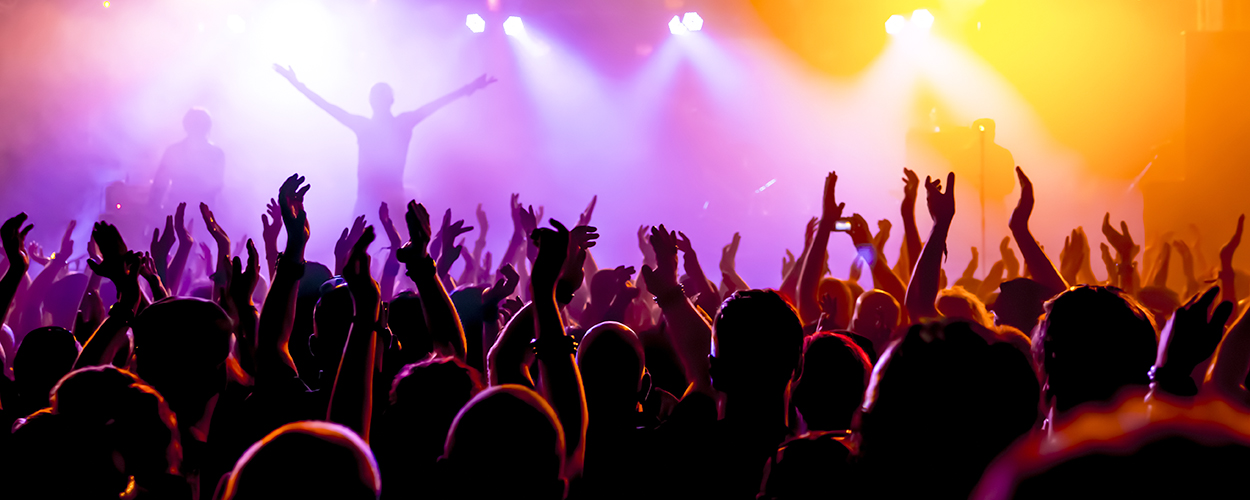
Here we go – find out about more about how artists make money from their live performances and the live side of the music industry.
You can also download the slides that accompany the lecture version of this guide and check out more live music resources available elsewhere in the CMU library.

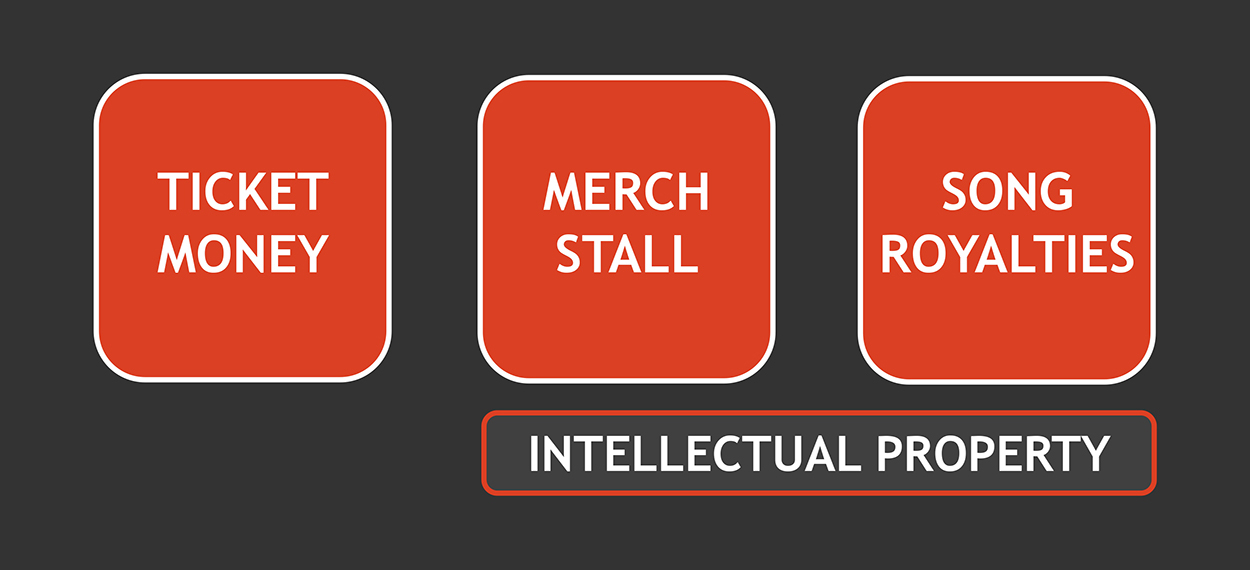
#01: For artists, the key live music revenue streams are tickets, merch and royalties.
Live performance is obviously a key revenue stream for many artists – and the most obvious way that gigs, tours, concerts and shows make money is through the sale of tickets.
What the artist earns from the show may be directly linked to ticket sales. Many artists early on in their career promote their own shows, or work with promoters and venues on a box office split basis.
Though artists prefer to work on fee or guarantee basis, where the promoter of the show pays the artist a fixed fee for their performance, or at least guarantees them a certain amount of money in addition to a box office split.
However, the fee or guarantee an artist will be offered is generally directly linked to the ticket sales the promoter or venue thinks the artist will help generate. The more the promoter thinks they can make from ticket sales the higher the fee or guarantee they will offer the artist.
But it’s important to remember that there are other ways artists make money from their live shows – in particular merchandise sales and song royalties.
Shows provide a great opportunity for artists to sell merchandise to fans. At a grass roots level artists or their team will usually run the merch stall and get to keep any monies generated. At bigger venues, the venue might help run the merch stall, but will then usually take a cut of the money in return.
If an artist performs their own songs, then additional royalties are due, because copyright provides creators with control over the performance of their music, and therefore the promoter of the show – or sometimes the venue – needs to buy a licence to cover that performance.
That licence fee usually has to be separate to any other fees the artist receives, because if the artist is a member of a collecting society like PRS, then – in most cases – only the society can issue the licence.
So the promoter or venue gets a licence from PRS, which then collects payment and passes that back to the artist as the songwriter (if the writer is published, the publisher would receive a share of that money too).
Merchandise sales and song royalties are technically intellectual property revenue streams rather than live performance revenue streams, but the live show provides a platform where merch can be sold and song copyrights exploited. So they are part of the live business too.
It’s important artists maximise merchandise sales and collect all their song royalties from their shows. Especially as – at the grass roots level – the fee or split of ticket monies that the artist receives isn’t necessarily enough to ensure the gig is profitable for the artist once all the costs of getting to and delivering the show are covered.

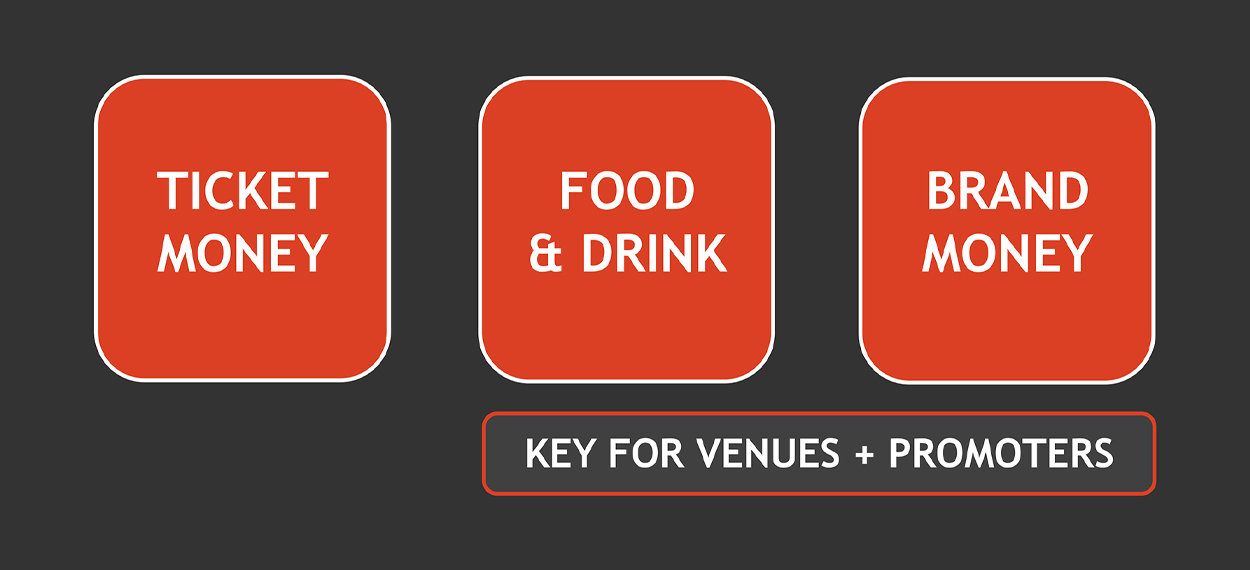
#02: For the industry, the key live music revenue streams are tickets, food and drink, and brand money.
On the industry side of all this, ticket sales are also an important revenue stream, because the promoter will get a cut of the box office. Although, especially with bigger shows, that will often be a minority cut.
But, just like the artists, promoters and venues have other ways of making money too. Food and drink is a key revenue stream for the live side of the business. While fans are in the venue – or at the festival – there is a captive audience that can be sold food, drink and other services. For venues in particular, food and drink sales can be key.
Brands also spend quite a lot of money in live music through sponsorship, advertising and other marketing activity. Brands might want their name above the door of the venue or on the festival poster; or access to tickets to give away to customers and VIPs; or simply to be able to offer their customers priority access to tickets to in-demand shows.
If a brand gets involved in a specific show or tour, then the artist will be part of that deal. But often brands work with venues and festivals more generally, and artists are not usually involved in that kind of activity.

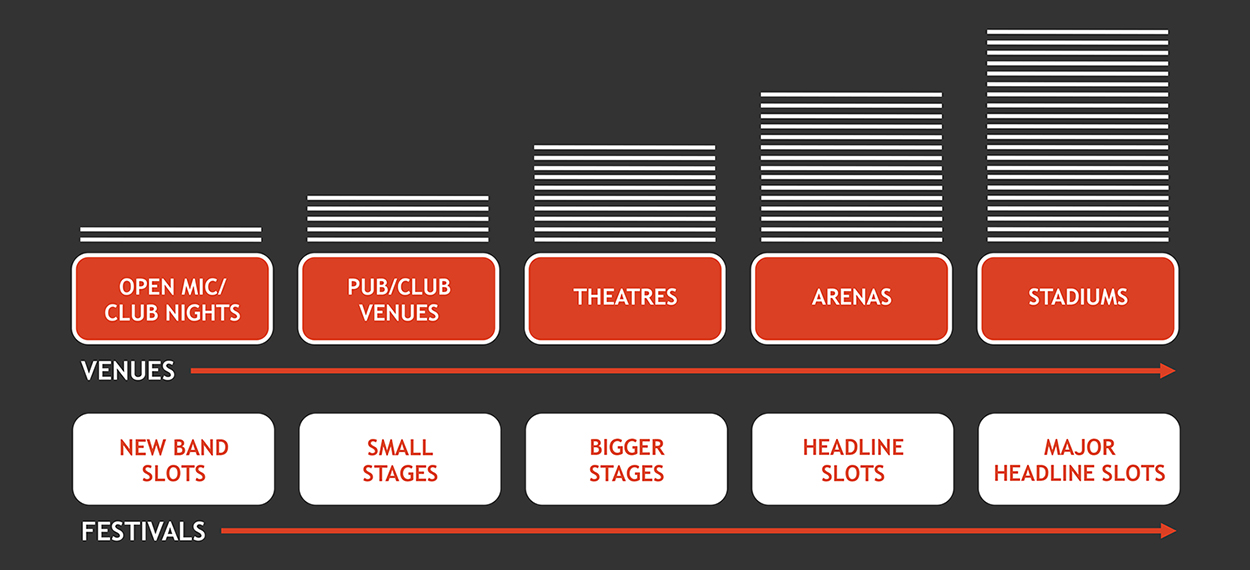
#03: Artists work their way up the live music ladder – early on gigs are as much about fanbase building as making money.
As an artist’s career progresses they will work their way up the live music ladder, playing bigger capacity venues and appearing higher up the bill at festivals as their fanbase starts to grow.
That journey will often being with open mic nights, or performances in bars and cafes, or support or guest slots at regular gig or club nights.
The artist then starts playing at grassroots venues, then bigger clubs and small theatres, then the bigger theatres and concert halls, and – possibly, albeit in a minority of cases – onto arenas and stadiums.
There is a lot of economies of scale in live music, which means the bigger the audience the bigger the profit margin. Of course some artists will put a lot more into production for bigger shows on bigger stages, but the real challenge is making a profit when you are playing to 60 people a show.
At that level it is really important that the artist minimises their costs, and also maximises merchandise sales and collects any song royalties they are due, in addition to any fee, to ensure they go into profit.
That said, early on in an artist’s career playing live is often as much about fanbase building as it is making money. Getting out and playing live is a great way to engage potential new fans and to enhance the relationship with existing fans – growing the fanbase and the artist’s business.
With that in mind, artists should always be looking for subtle ways to encourage audience members to check out their music and other content online, and to connect with the artist on an ongoing basis via digital channels.

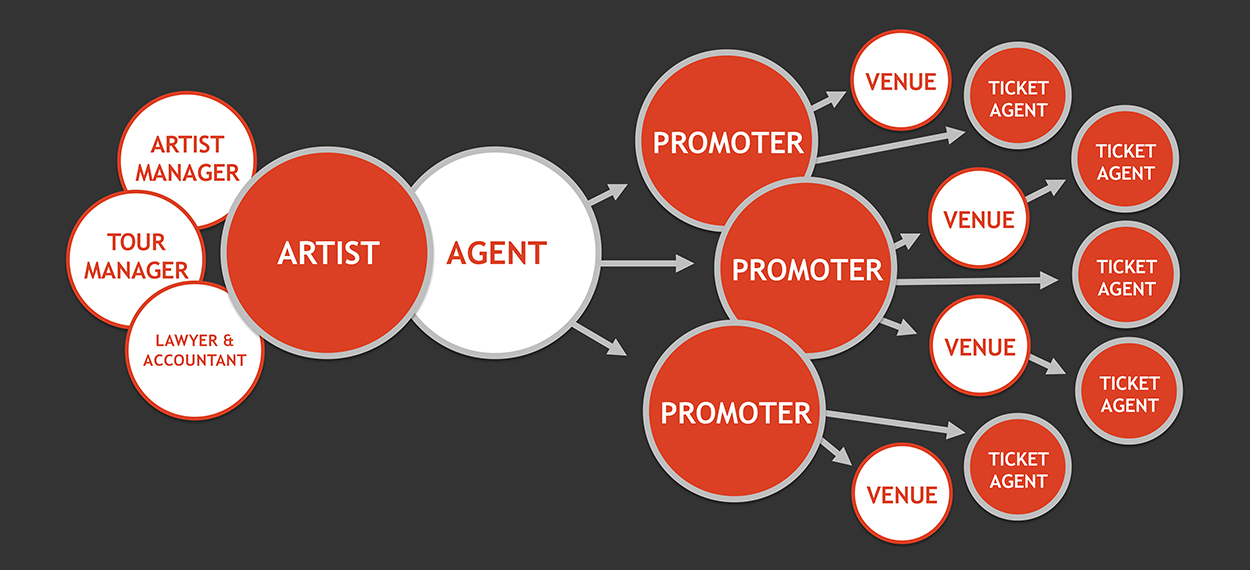
#04: Artists work with business partners on their shows and tours.
Artists work with a number of business partners in the music industry in order to stage their shows and tours.
A primary business parter is the promoter, who is usually the financial risk taker on the show. They pay the artist a fee or a guaranteed minimum with a box office split. They book and pay for the venue, put the tickets on sale and work with the artist on marketing. Promoters also often have their own marketing channels via which they can sell tickets.
Some venues have in-house promoters who book shows exclusively for that space. Then there are promoters who book shows into lots of venues, maybe in one region or maybe nationally. Venues with in-house promoters will also usually host shows organised by those other promoters.
Some promoters are also involved in organising festivals – sometimes exclusively or sometimes alongside promoting other gigs and concerts.
Artists will initially build their own relationships and negotiate bookings with promoters, usually in their local area. Though as an artist’s career progresses, they will probably ally with a booking agent.
The agent then looks for opportunities for the artist to play live – utilising their contacts – and then negotiates the deals with each promoter, and generally advises the artist on how to grow the live side of their career.
Other business partners on the live side obviously include the venues and everyone involved in the production of each show or tour, some of whom will work for the venue, some for the promoter and some for the artist.
Then there is the ticket agent, the company that facilitates the sale of tickets. The ticket agent obviously provides the website and app via which people buy their tickets, and the accompanying customer support.
But they can also be important marketing partners for an artist and promoter, helping to sell the show by utilising their data and networks. Plus they may also provide important cash flow for the promoter.

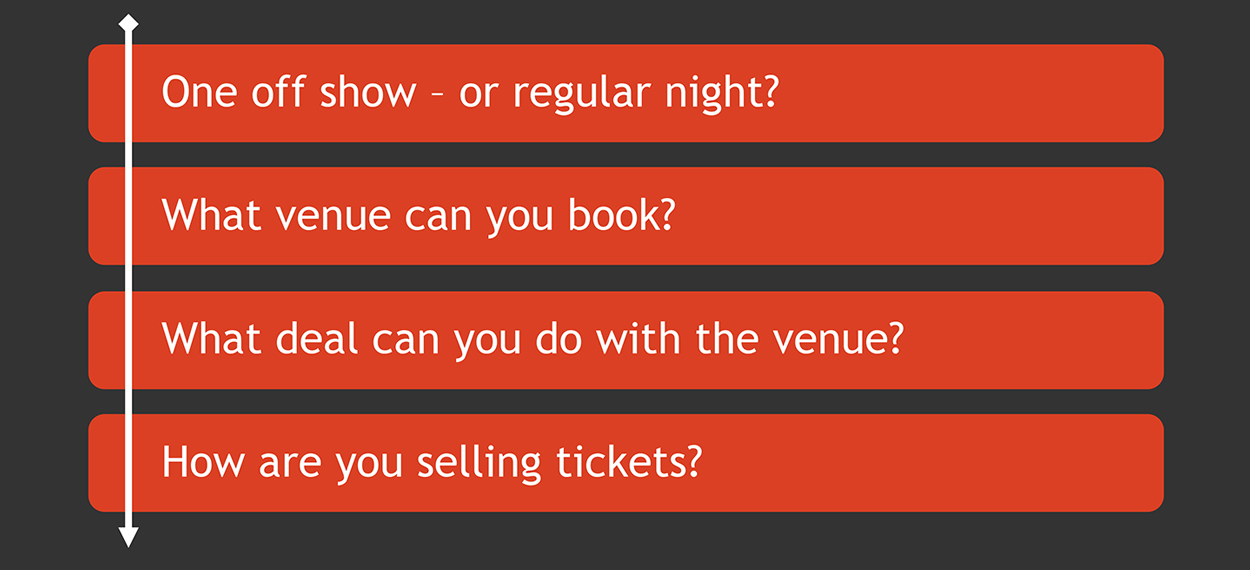
#05: Artists often stage their own shows to get their live careers started.
One challenge for new artists is proving to venues and promoters that they can pull an audience into a show. How can can an artist prove they can do that until someone books them to play a gig?
One option is for the artist to stage their own show. So, after playing some open mic nights or guest spots, the artist might organise their own headline show, usually in their local area. Grassroots venues will often offer artists very good deals for shows like this, especially early in the week.
The artist then needs to do some good marketing, fill out the venue and put on a great night. They should also document the whole experience, publish footage from the night on their social channels and website, and use it to persuade other venues and promoters to book them to play.
If an artist stages their own show, they need to be very clear when booking the venue what each party is bringing to the table – ie what services and equipment will the venue provide as part of the booking?
Indeed, even when artists work with promoters, they need to be very clear on what the promoter and venue will provide, and what the artist needs to provide. Assume nothing! Identify everything that is required for a successful show and be clear on who is taking responsibility for what.





